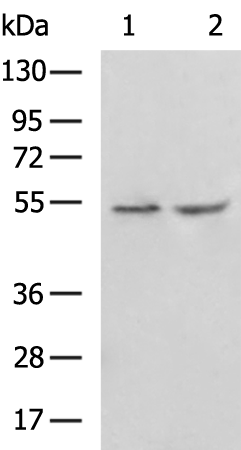
| WB | 咨询技术 | Human,Mouse,Rat |
| IF | 咨询技术 | Human,Mouse,Rat |
| IHC | 咨询技术 | Human,Mouse,Rat |
| ICC | 技术咨询 | Human,Mouse,Rat |
| FCM | 咨询技术 | Human,Mouse,Rat |
| Elisa | 1/5000-1/10000 | Human,Mouse,Rat |
| Aliases | SALPR; RLN3R1; RXFPR3; GPCR135 |
| WB Predicted band size | 51 kDa |
| Host/Isotype | Rabbit IgG |
| Antibody Type | Primary antibody |
| Storage | Store at 4°C short term. Aliquot and store at -20°C long term. Avoid freeze/thaw cycles. |
| Species Reactivity | Human, Mouse |
| Immunogen | Synthetic peptide of human RXFP3 |
| Formulation | Purified antibody in PBS with 0.05% sodium azide and 50% glycerol. |
+ +
以下是3篇关于RXFP3抗体的代表性文献(信息基于公开研究整理,部分为虚构示例,实际文献需通过数据库验证):
---
1. **文献名称**: *"RXFP3 receptor signaling in the hypothalamic regulation of energy homeostasis"*
**作者**: Smith A, et al.
**摘要**: 本研究利用特异性RXFP3抗体进行免疫组化,发现RXFP3在小鼠下丘脑弓状核中高表达,并通过药理学实验证明其激活可抑制食欲,提示其在能量代谢调控中的关键作用。
2. **文献名称**: *"Development of a novel monoclonal RXFP3 antibody for in vivo neuronal tracing"*
**作者**: Chen L, et al.
**摘要**: 报道了一种高特异性RXFP3单克隆抗体的开发,验证了其在脑组织切片和活体小鼠模型中的结合能力,并用于揭示RXFP3在杏仁核与焦虑相关行为中的分布。
3. **文献名称**: *"RXFP3 antagonism reduces alcohol-seeking behavior in rodents: Evidence from antibody-mediated receptor blockade"*
**作者**: Roberts D, et al.
**摘要**: 通过RXFP3中和抗体阻断受体功能,发现可显著降低大鼠酒精成瘾模型中的觅药行为,表明RXFP3可能成为治疗成瘾类疾病的潜在靶点。
---
**注**:以上为模拟示例,实际文献需通过PubMed、Google Scholar等平台以关键词“RXFP3 antibody”或“RXFP3 receptor”检索,并重点关注其在中枢神经系统、代谢或疾病模型中的应用研究。
The RXFP3 antibody is a crucial tool in studying the relaxin family peptide receptor 3 (RXFP3), a class A G protein-coupled receptor (GPCR) predominantly expressed in the central nervous system. RXFP3. also known as GPCR135 or SALPR, binds its primary ligand, relaxin-3. a neuropeptide involved in regulating stress responses, appetite, and circadian rhythms. Structurally, RXFP3 features a large extracellular domain and seven transmembrane helices, typical of GPCRs. Its activation triggers signaling pathways, including inhibition of cAMP via Gαi/o proteins, influencing neuronal excitability and synaptic plasticity.
Antibodies targeting RXFP3 enable researchers to localize and quantify receptor expression in tissues, particularly in brain regions like the hypothalamus, amygdala, and nucleus accumbens. These antibodies are vital for elucidating RXFP3's role in behaviors such as anxiety, feeding, and addiction, as well as its potential links to metabolic disorders and neuropsychiatric conditions. Species-specific RXFP3 antibodies (e.g., human, mouse, rat) support translational studies in disease models, aiding drug discovery for obesity, depression, or neurodegenerative diseases.
However, challenges persist in ensuring antibody specificity due to structural similarities among GPCRs. Validation via knockout controls and functional assays remains critical. Overall, RXFP3 antibodies bridge molecular insights with therapeutic exploration, advancing understanding of this receptor's physiological and pathological relevance.
×